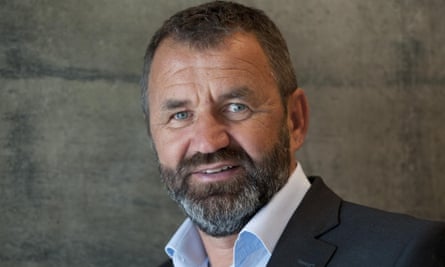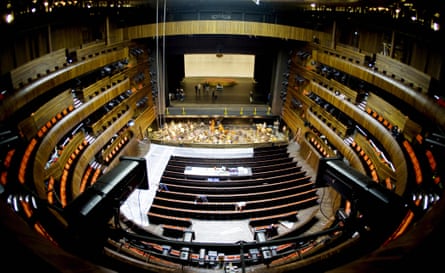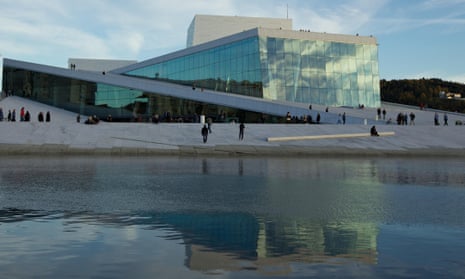Norway’s national opera opened to worldwide acclaim in 2008, its gleaming marble home on the banks of the Oslo fjord making a bold and optimistic statement about the future. But, behind the ice-cool facade, tensions in recent weeks have been boiling over in an off-stage drama in which the opera’s staff have been compared to the Hebrew slaves singing for freedom in Verdi’s Nabucco.
Singers and musicians have staged “a palace revolt” against the director, Per Boye Hansen, who in turn has rallied support from opera stars across Europe and hinted at a “Kafka-like” vendetta against him. Each side has traded allegations in the media, revealing a violent clash of egos and ambitions in the world of classical opera.
The very public washing of dirty linen was triggered by a surprise announcement from the board in May that Hansen, against his wishes, had been told to leave when his contract expires in two years’ time. The Norway opera’s internationally renowned boss has faced artistic criticism from a conservative cultural establishment, but also from his staff, who have baulked at his allegedly autocratic leadership style.
The criticism has exasperated the cognoscenti, according to whom Hansen is quite simply one of Europe’s finest cultural leaders. In a letter to Norway’s government, 16 international opera figures pleaded for the 57-year-old to stay on after 2017, arguing that his devoted efforts in his homeland had made the Norwegian national opera one of the leading ensembles outside Scandinavia.
Eivind Gullberg Jensen, one of Norway’s best-known classical conductors, said he was shocked Hansen would have to go so soon. “He has barely begun, and he has done a brilliant job so far,” he told the Guardian. Pianist Leif Ove Andsnes said Hansen’s departure was “incomprehensible”, after he had set the opera house on the map internationally.
However, from inside the opera itself, a different story has emerged. Ellen Horn, the opera board’s outgoing chairman, said Hansen had been a “brilliant” opera director who had lifted it into an international league. But the board had received reports of concern from staff, which it had investigated, she said.

Anonymous comments from staff appeared in Norwegian media alleging that Hansen was manipulative, uncompromising and prone to outbursts. For three years, they had endured a moody and self-centred boss, according to an opinion piece in the newspaper Dagbladet by lecturer and musician, Øystein Imsen.
Hansen responded with a seven-page letter that was leaked to the press, in which he claimed he had not been told of “a single verifiable, concrete event or action that supports allegations of misconduct or unacceptable management style from my side”. He told the Aftenposten newspaper: “Creating art is not an exercise in democracy.”
The row has focused attention on Hansen’s artistic achievements. Calling on the director to quit immediately, the tenor Øystein Wiik said he could not understand why Hansen’s production of Offenbach’s Tales of Hoffmann had been “set in a landfill”, with Hoffmann himself “staggering around drunk and a bottle of whiskey glued to his hand”.
Hansen had staged several “offbeat” productions with provocative, tasteless antics, said Henning Høholt, editor of online reviews magazine Kulturkompasset. “He thought Norway was ready for that. But he can’t just take his friends from Germany up here and expect we will also say ‘How wonderful!’. People don’t want to see it.”

Paul Curran, Hansen’s predecessor as director of the Norway opera, resigned six months before his contract expired after a disagreement with the chief executive.
There has been “an awful lot of criticism” at every level, Curran said. Numerous former colleagues at the opera had said they had written a letter to the chief executive, Nils Are Karstad Lysø. “This was effectively a vote of no confidence, they couldn’t work with Hansen. It was a palace revolt.”
But Curran also pointed to the very different workplace culture in Norway, in which there is a strong ethos of fairness and “Janteloven”, or the law of Jante – a Scandinavian phenomenon where no one can be considered to be better than anyone else and everyone, including the cleaners, must have an equal say.
“It is harder to run an opera house in Norway than in Berlin,” Jensen said, “because in Germany, a leader is expected to use their power combined with very good artistic leadership. In Norway, if you stick your face too far forward you somehow have to pay for it.”

Baritone Espen Landvik, representing soloists at the opera, wrote on his blog that since Norway abolished its aristocracy in 1814 its society had had a flat structure, “and it’s not so easy to swallow for many”. The opera director is at the top and has ultimate control, but a production should be the result of collaboration with the performing artists based on cooperation and mutual respect, Landvik added.
Jan Koop, a German cellist and steward for the MFO musicians’ union at the opera, said employees in Norway enjoyed stronger workplace rights, so an opera director couldn’t just come in and change everything. “The board has had to look at what the employees need to deliver high quality,” Koop said. “That’s probably a bigger issue here than abroad, because employees are better protected and better organised – and we dare to speak up about problems.”
Hansen, Lysø, Horn and Landvik declined to comment.

Comments (…)
Sign in or create your Guardian account to join the discussion